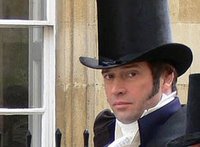 I really enjoyed the BBC's 80 minute drama based on Ian Kelly's excellent biography of Beau Brummell. The title role was played by James Purefoy, seen recently playing Mark Anthony in the HBO/BBC miniseries Rome, and as the Black Prince in A Knight's Tale. He has previous Regency form too, having played Tom Bertram in the BBC Mansfield Park from 1999. Here he came across as cool and devilishly handsome, but deeply insecure.
I really enjoyed the BBC's 80 minute drama based on Ian Kelly's excellent biography of Beau Brummell. The title role was played by James Purefoy, seen recently playing Mark Anthony in the HBO/BBC miniseries Rome, and as the Black Prince in A Knight's Tale. He has previous Regency form too, having played Tom Bertram in the BBC Mansfield Park from 1999. Here he came across as cool and devilishly handsome, but deeply insecure.It would have been impossible to have fitted everything contained in Ian Kelly's book into such a short space of time, so the writer went for something of an impressionistic approach. We learn nothing of Brummell's origins, except that he came from nowhere.
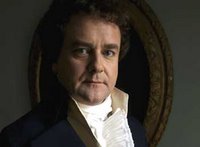 How he came to gain the intimate friendship of the Prince of Wales (superbly played by Hugh Bonneville, another Mansfield Park alumnus) is not addressed (Brummell served in Prinny's regiment, the 10th Light Dragoons). We are instead taken straight to the Prince's plans for his wedding (there is a Realplayer video clip of this on the BBC4 website), and Brummell's advice that "less is more", as far as fashion is concerned.
How he came to gain the intimate friendship of the Prince of Wales (superbly played by Hugh Bonneville, another Mansfield Park alumnus) is not addressed (Brummell served in Prinny's regiment, the 10th Light Dragoons). We are instead taken straight to the Prince's plans for his wedding (there is a Realplayer video clip of this on the BBC4 website), and Brummell's advice that "less is more", as far as fashion is concerned.The screenwriter, Simon Bent, has simplified aspects of Brummell's life are simplified for the benefit of the dramatic flow.
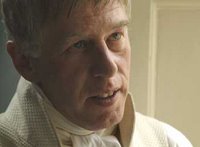 For example his valet, Robinson, (played by Phil Daniels) stays with the Beau through the story until his final ruin. The real Robinson served Brummell for ten years before moving on, to be replaced by a succession of others. This was a drama and not a documentary. It was true to the underlying course of events, if not to every detail.
For example his valet, Robinson, (played by Phil Daniels) stays with the Beau through the story until his final ruin. The real Robinson served Brummell for ten years before moving on, to be replaced by a succession of others. This was a drama and not a documentary. It was true to the underlying course of events, if not to every detail.We had many of the most well known Brummell anecdotes depicted: the audience who came to watch him dress; the incident with the Prince and the snuffbox; and the infamous "who's your fat friend?" quip that went so horribly wrong. We also had Lord Byron (Matthew Rhys).
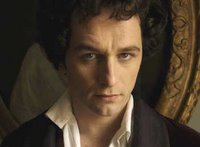 Kelly speculates about a possible homosexual relationship between Brummell and Byron, but seems to come down against it having happened. Bent uses an ill-defined three-way relationship between Brummell, Byron, and Brummell's childhood sweetheart and, later, leading courtesan, Julia Storer/Johnstone (played by Zoe Telford) as the reason for Brummell's falling out with the Prince. Byron gets to deliver his famous remark that the three great men of the age are himself, Napoleon, and Brummell when they first meet. In fact Byron made the remark much later, when all three were exiled from their homelands.
Kelly speculates about a possible homosexual relationship between Brummell and Byron, but seems to come down against it having happened. Bent uses an ill-defined three-way relationship between Brummell, Byron, and Brummell's childhood sweetheart and, later, leading courtesan, Julia Storer/Johnstone (played by Zoe Telford) as the reason for Brummell's falling out with the Prince. Byron gets to deliver his famous remark that the three great men of the age are himself, Napoleon, and Brummell when they first meet. In fact Byron made the remark much later, when all three were exiled from their homelands.The story ends with Brummell's flight to France on Thursday 16 May 1816, We are not shown his subsequent decay into squalor and syphilitic insanity, although Kelly details this in his book.
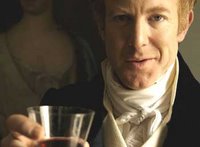 So what might Ian Kelly have made of this adaptation. It is pretty clear that he approved, for he took part in it, playing Lord Robert Manners, a member of the Dandaical Body. In the programme he appears as the voice of caution, seeking (but failing) to prevent his brother entering a joint loan agreement with Brummell and the Marquess of Worcester as the end loomed. In fact Manners entered into at least one such arrangement himself, but both he and his brother Charles (Nicholas Rowe) were comfortably bankrolled by their brother, the Duke of Rutland. When the crash came, they survived, but Brummell, who had come from nowhere, returned there at the last.
So what might Ian Kelly have made of this adaptation. It is pretty clear that he approved, for he took part in it, playing Lord Robert Manners, a member of the Dandaical Body. In the programme he appears as the voice of caution, seeking (but failing) to prevent his brother entering a joint loan agreement with Brummell and the Marquess of Worcester as the end loomed. In fact Manners entered into at least one such arrangement himself, but both he and his brother Charles (Nicholas Rowe) were comfortably bankrolled by their brother, the Duke of Rutland. When the crash came, they survived, but Brummell, who had come from nowhere, returned there at the last.I expect that the programme will be repeated on BBC2 in due course. Well worth watching out for.

7 comments:
Moan, whine, moan, whine. I got a Freeview box the other week, with the intent of watching progs like this. What happens? The bloomin' thing won't tune properly. So I'll have to wait to see This Charming Man ...
Stephen, how common was syphilis? It makes me wonder how realistic it is that all the rakish heroes in romance would be 'clean' and have a HEA. If they're really syphilitic and about to infect the heroine, that's not very romantic (and would the syphilis be passed on in utero to their children?), but presumably it would be quite likely. Or was syphilis quite rare?
How interesting: I was disappointed with this dramatisation. I thought it was much too violent and sordid and went no way to showing the personal charm of this man. Brummell must have been extraordinary if, after years in exile, his friends were still trying to find him a job so he could support himself. Also, Purefoy smirked too much!
Hope we get it over here in the States. I'm not sure our BBC channel gets everything (or perhaps we get everything a few months later than you folks do). Sounds interesting.
Laura's question makes me wonder whether any historical romances ever dealt with a syphilitic character. Too much to ask that it be the hero/heroine, but a secondary character?
In Miranda Jarrett's April 2006 Mills & Boon release, The Golden Lord, the heroine thinks that she's ready to risk contracting a venereal disease from the hero (who's been extremely promiscuous) because she loves him. I was rather taken aback, and that, together with the mention of Brummell's syphilis were what prompted my question.
Hey Stephen, you okay? It's been a while since you posted.
Phil Davis not Phil Daniels played Robinson
Post a Comment